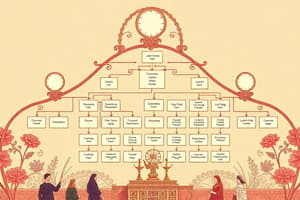Podcast
Questions and Answers
What is the primary focus of consultative leadership?
What is the primary focus of consultative leadership?
- Fostering competition among team members
- Maintaining strict authority over followers
- Implementing unilateral decisions swiftly
- Encouraging input and engagement from group members (correct)
In the Situational Leadership Model, what does 'S3' represent?
In the Situational Leadership Model, what does 'S3' represent?
- Delegating
- Selling/Directing
- Participating/Supporting (correct)
- Telling/Coaching
Who is associated with the concept of Servant Leadership?
Who is associated with the concept of Servant Leadership?
- Robert Kennedy
- Robert K. Greenleaf (correct)
- Paul Hersey
- Kenneth H. Blanchard
What is a fundamental characteristic of Transformational Leadership?
What is a fundamental characteristic of Transformational Leadership?
What is one of the steps suggested for sustaining change?
What is one of the steps suggested for sustaining change?
What is the primary focus of leaders compared to managers?
What is the primary focus of leaders compared to managers?
Which leadership style allows for the most participation in decision-making?
Which leadership style allows for the most participation in decision-making?
What type of skill is primarily about forming strategies and long-range plans?
What type of skill is primarily about forming strategies and long-range plans?
Which statement about situational leadership is true?
Which statement about situational leadership is true?
Which characteristic is NOT associated with management?
Which characteristic is NOT associated with management?
What is a key trait of laissez faire leaders?
What is a key trait of laissez faire leaders?
In what way do leaders differ from managers regarding their relationship with subordinates?
In what way do leaders differ from managers regarding their relationship with subordinates?
Which aspect is not essential for sustaining change in an organization?
Which aspect is not essential for sustaining change in an organization?
Flashcards
Organizational Leadership Definition
Organizational Leadership Definition
Leadership within an organization, encompassing various roles like teachers, school heads, and classroom managers, focusing on setting strategic goals and motivating individuals to achieve objectives.
Leadership vs. Management
Leadership vs. Management
Leaders prioritize innovation and people-focused approaches, while managers focus on administration and tasks. Leaders inspire, and managers direct.
Leadership Skills (3 Types)
Leadership Skills (3 Types)
Effective leaders possess technical skills (processes), human skills (people), and conceptual skills (ideas/frameworks).
Autocratic Leadership Style
Autocratic Leadership Style
Signup and view all the flashcards
Democratic Leadership Style
Democratic Leadership Style
Signup and view all the flashcards
Laissez-faire Leadership Style
Laissez-faire Leadership Style
Signup and view all the flashcards
Situational Leadership
Situational Leadership
Signup and view all the flashcards
Servant Leadership
Servant Leadership
Signup and view all the flashcards
Kanya-kanya Mentality
Kanya-kanya Mentality
Signup and view all the flashcards
Consultative Leadership
Consultative Leadership
Signup and view all the flashcards
Situational Leadership Model
Situational Leadership Model
Signup and view all the flashcards
Transformational Leadership
Transformational Leadership
Signup and view all the flashcards
Study Notes
Organizational Leadership
- Learning Outcomes: Explain organizational leadership, distinguish leadership from management, explain situational leadership and servant leadership, and discuss sustaining change in organizations.
- Key Roles: Teachers (CPD – Promotion), School Heads, Classroom Managers
- Leaders' Role: Set strategic goals for the organization, motivate teachers, parents, learners, and non-teaching personnel to achieve school goals
- Organizational Leadership Defined: An attitude and work ethic that empowers individuals to lead from any position within an organization (e.g., teacher leadership).
- Leadership vs. Management: A table comparing managers and leaders:
- Managers: Administer, work-focused, have subordinates, do things right
- Leaders: Innovate, people-focused, have followers, do the right thing
- Key Skills for Leaders:
- Technical skills
- Human skills
- Conceptual skills
- Leadership Styles:
- Autocratic: Decision-making by the leader, meetings don't necessarily involve stakeholder approval
- Democratic: Members fully participate in decision-making leading to consensus
- Laissez-faire: Avoidance of responsibility, allowing members to manage their own work (kanya-kanya mentality)
- Consultative
Situational Leadership Model
- Leadership style adapts to the readiness and willingness of group members
- Paul Hersey and Kenneth H. Blanchard (1996) model:
- S1 (Selling/Directing): high task/low relationship.
- S2 (Telling/Coaching): high task/moderate relationship.
- S3 (Participating/Supporting): moderate task/high relationship.
- S4 (Delegating): low task/low relationship.
Servant Leadership
- Robert K. Greenleaf (1977)
- Servant's feeling
- public servants" are a part of this.
Transformational Leadership
- Robert Kennedy
- Not content with the status quo
- Positive changes are a focus
Sustaining Change
- Reforms to transform, innovations introduced by the transformational leader must be institutionalized and sustained:
- Seek stakeholder support
- Involve people early and often
- Plan a communications campaign to sell the innovation
- Ensure the innovation is understood by all
- Consider timing and phasing aspects of change
Studying That Suits You
Use AI to generate personalized quizzes and flashcards to suit your learning preferences.




